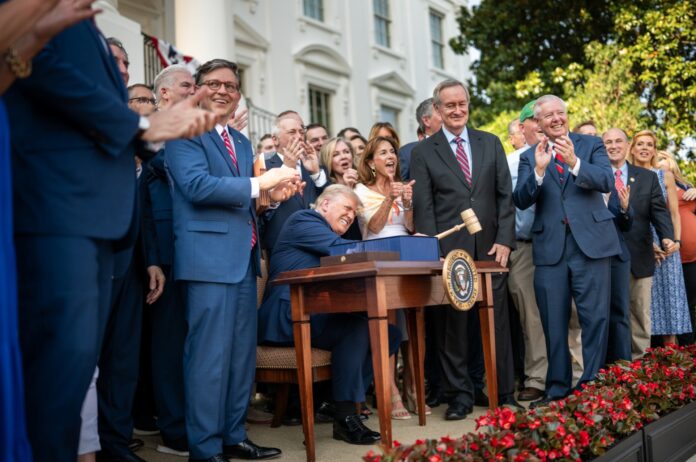The newly signed One Big Beautiful Bill that President Donald Trump signed into law on Independence Day is reshaping the federal tax landscape with tax relief for individuals, families, and businesses.
The measure makes permanent and expands many provisions from the 2017 Tax Cuts and Jobs Act, while rolling back green energy tax breaks and offering new targeted deductions.
Many of these tax cuts may have the effect of stimulating the economy, although analysts also estimate it will drive national debt higher, as the government will be foregoing trillions in tax remittances from American workers. That may be offset by economic growth.
The One Big Beautiful Bill is projected to deliver substantial after-tax income gains for most Americans, with middle-income households seeing the biggest boosts, according to economic estimates released this week.
An analysis by the Tax Foundation shows that the bill will increase after-tax income by 2.9% in 2025, rising to 5.4% in 2026 as the continuation of individual tax cuts from the 2017 Tax Cuts and Jobs Act (TCJA) takes full effect.
By 2034, the overall impact of the legislation on market income will moderate to 2.8% income retention due to the expiration of some temporary provisions. However, when accounting for increased economic growth from permanent measures—such as full expensing for equipment and research and development—market incomes are expected to rise 3.6% on a dynamic basis.
Middle-income earners are poised to benefit most in the near term, especially in 2026, thanks to the extension of TCJA provisions and new targeted tax relief for seniors, overtime workers, and employees in tipped industries.
On balance, most taxpayers will experience measurable income growth, especially during the years when the individual tax cuts are most fully in force.
Here’s a breakdown of the major tax changes included in the law:
Individual Tax Relief
Bracket Adjustments and Standard Deduction Enhancements:
- The bill makes permanent the lower tax rates first enacted under the expiring Trump tax cuts in 2017, with inflation adjustments extended by an extra year for the 10%, 12%, and 22% brackets.
- The standard deduction is enhanced, starting in 2025 at $31,500 for joint filers, $23,625 for heads of household, and $15,750 for others, with annual inflation adjustments.
Child and Senior Tax Benefits:
- The child tax credit is now permanently set at a higher maximum of $2,200 in 2026, indexed to inflation.
- A new senior deduction of $6,000 per qualifying individual will be available from 2025 through 2028. It applies to both itemizers and non-itemizers, phasing out at $75,000 in modified adjusted gross income.
Mortgage and SALT Deductions:
- The $750,000 cap on mortgage interest deductions is made permanent.
- The cap on state and local tax (SALT) deductions temporarily rises to $40,000 in 2025 and will increase 1% per year through 2029, before dropping to a flat $10,000 in 2030. A phaseout begins for incomes above $500,000.
Other Individual Provisions:
- Several itemized deduction limits are locked in, including the end of miscellaneous deductions (except for educators), and restrictions on personal casualty losses and moving expenses.
- A cap is introduced: taxpayers in the top bracket can only deduct 35 cents per dollar of itemized deductions.
- A permanent $1,000 ($2,000 for joint filers) above-the-line charitable deduction is created, alongside a new 0.5% floor on itemized charitable deductions.
- The Alternative Minimum Tax exemption increase is made permanent, and the phaseout thresholds revert to 2018 levels.
Temporary Individual Deductions (2025–2028):
- Up to $25,000 of tip income becomes deductible for workers in traditionally tipped industries.
- Overtime pay deductions of up to $12,500 ($25,000 for joint filers) are allowed, phasing out at higher incomes.
- Interest on U.S.-made auto loans can be deducted up to $10,000, with income-based phaseouts.
Estate Tax Reform
- Starting in 2026, the estate and lifetime gift tax exemption doubles to $15 million for individuals and $30 million for couples, indexed to inflation.
Business Tax Reforms
Incentives for Investment and Innovation:
- Businesses can now permanently expense domestic research and development costs. Small businesses with under $31 million in gross receipts can retroactively expense R&D back to 2021.
- Immediate expensing is restored for short-lived assets, and 100% bonus depreciation is reinstated.
- A temporary provision allows 100% expensing of qualifying building structures through 2029.
Pass-Through Entities and Interest Deductions:
- The 20% pass-through deduction (Section 199A) becomes permanent, with expanded income thresholds and a $400 minimum deduction for qualified small business income.
- The EBITDA-based limit on net interest deductions is restored permanently. (Earnings Before Interest, Taxes, Depreciation, and Amortization.)
Corporate Charitable Giving and Green Energy Rollbacks:
- A 1% floor for corporate charitable contribution deductions.
- Several Inflation Reduction Act tax credits are repealed or scaled back, including clean electricity credits (45Y and 48E) are eliminated for projects placed in service after 2027, except for nuclear, hydropower, geothermal, and battery storage.
- The clean hydrogen credit ends after 2027.
- The energy-efficient commercial buildings deduction is repealed.
- The clean fuel production credit is extended through 2030 with expanded eligibility.
- New restrictions targeting “foreign entities of concern” are placed on energy credits including those for wind, solar, hydrogen, and nuclear.
- Publicly traded partnerships can now include income from hydrogen storage, carbon capture, and other clean power sources in their qualifying income calculations.
